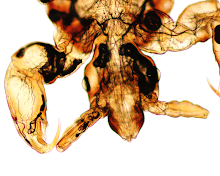This definition is, admittedly, broad.
Most would agree that a worm that lives in the intestinal tract of another organism and draws blood and nutrients from its host is a clear example of a parasite.
A body louse (pictured on the upper right of this page) that feeds on humans is also a parasite. In this case, it is an ectoparasite; it that lives on the outside of its host.
In contrast, a bacterium that lives in the mouth of a healthy individual without causing any notable harm is NOT considered to be a parasite.
But what happens when this same bacterium invades the throat and causes severe pharyngitis, known to most as "Strep throat." Is it now considered a parasite?
A bit harder to answer.
The same question could be applied to viruses and fungi.
Finally, would a human fetus inside the womb be considered a parasite? I'll let you answer that one for yourself.
For the purpose of this blog, I will limit my definition of a parasite to an organism that is phylogenetically unrelated to its host, lives in or on its host, and is a eukaryote. The latter excludes bacteria and viruses. By tradition, fungi are also excluded (although they are also eukaryotic). Our focus will be parasites of humans, although I'll likely throw in an odd reptile or amphibian parasite just for fun. Enjoy!


